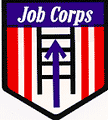|
What is Job Corps?
Job Corps is an education and training program for low-income
young men and women, ages 16 through 24 at the time of enrollment. It
is primarily a residential program in which students live in dormitories
on Job Corps centers. This provides a supervised environment where
students can be directed and guided in learning the skills needed
for success in America's workforce. Job Corps was established in
1964 and has trained more than 2 million individuals since then.
Back to Top
Where are Job Corps centers located?
Job Corps has 122 centers in 46 states, the District of Columbia,
and Puerto Rico. In support of the Job Corps centers there are outreach,
admissions and career transition operations at hundreds of locations,
particularly at many One-Stop Career Centers.
In California there are Job Corps centers not only in San Jose,
but also in San Diego, San Bernardino, Long Beach, Los Angeles,
San Francisco, and Sacramento. In Nevada there is a center in Reno.
In Arizona there are centers in Phoenix and Tucson, and there is
Job Corps also in Hawaii.
Back to Top
How do I get more information?
Telephone toll free 1-800-733-5627 for guidance on how to reach
your nearest admissions counselor. An admissions counselor can provide
information about individual Job Corps centers and the application
and admissions process.
Back to Top
What happens when you apply?
A Job Corps admissions counselor will guide you through the process
and determine if you are eligible for Job Corps, and/or if Job
Corps or some other program would best suit your needs.
If you continue the Job Corps application process, your admissions
counselor will help with filling out forms, give you information
about Job Corps centers in your area, information about facilities
and training at each center, answer your questions. You will be
asked to provide necessary documents and to remain in contact with
your admissions counselor as you wait to be assigned to a Job Corps
center.
Back to Top
What happens when you arrive as a new student at Job Corps?
Your admission counselor will give you an arrival date to report to your Job Corps center to begin the initial
part of the career development services system, the 60-day Job
Corps career preparation period.
If you live some distance from your Job Corps center, you are provided with transportation
to the Job Corps which is paid for by the federal government.
It can be a little scary to be going off to a new place where you
may not know anyone. Everyone has the same types of feelings. Its
natural, and all the students you meet will have gone through much
the same process. You may even be homesick at first, but if you
stick to it you can achieve your goals.
When you arrive you will be welcomed and begin your introduction
to center life. You will be assigned a dormitory room, begin making
friends, and in your first few weeks take physical and dental exams,
a drug test, tests to assess your skills and aptitudes, and learn
basic information technology, job search and employability skills.
These are the basic skills that will be the foundation for future
training and future employment.
Back to Top
What do Job Corps students learn?
Academic classes are available and students without diplomas are
expected to earn a GED or high school diploma. Students also learn
basic information technology skills, driver's education, vocational
skills, social skills, and employment skills - including job search
and job retention. Students may even, if suitable, enroll in leisure-time
college courses, leisure-time employment, or participate in work-based
learning internships.
Students receive regular evaluations of progress and update their
personal career development plans as they adjust to changes in their
competencies and in career goals. Students often find that they
have the ability, with education and training, to do more than they
once thought possible.
Students may remain in Job Corps for up to two years. Training
is self-paced but appropriate progress must be maintained. Job Corps
is a place to enjoy as well as a place to learn, but it is not a
place to kick back for a free ride.
American taxpayers fund Job Corps so that the young men and women
who join can graduate and enter the workforce, achieve the American
dream, and contribute in turn to the success of our nation.
Back to Top
|
Working with your admissions counselor, you will develop your initial
personal career development plan, a beginning guide for the education,
training and development needed as you move through the Job Corps
Career Development Services System (CDSS) towards your goals.
Success! Success! Success!
When students graduate they enter the Job Corps career transition
period and are assisted in gaining independent living skills, in
preparing for and obtaining a job or placement in advanced training
or college, or in the military. Either way, student-graduates have
earned one success after another in Job Corps, moving through the
career development services system towards self-sufficiency. Career
transition specialists work with students from the time they arrive
at Job Corps and through to graduation and follow-up.
Follow-up
To assure that the success of student-graduates as a part of America's workforce, Job Corps offers an array of support services, including 12 months of follow-up after exiting the program.
Career Transition Specialists help students with issues affecting job search, job retention, and other issues that impact employees such as housing, stress management, financial management, child care, justice system, legal issues, and the like. These services are often provided by linking graduates to partner programs and through the One-Stop Career system. |



